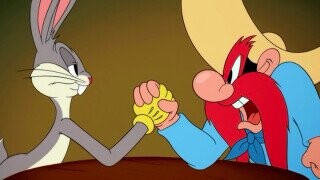Looney Tunes: Yosemite Sam’s Best Nonsense Swear Words, Ranked

If Yosemite Sam is remembered for one thing, it would be his massive, marvelous mustache. But if the Bugs Bunny villain is to be honored for a second accolade, it would be his colorful, almost-but-not-quite-off-color vocabulary, which has the whiff of obscenity but is cloaked in euphemisms and old-timey lingo.
Click right here to get the best of Cracked sent to your inbox.
Don't Miss
Since first appearing in 1945, Sam has lassoed himself a permanent place in pop culture and will continue to do so as long as some version of Looney Tunes is remembered or rebooted. So please enjoy these oh-so-Yosemite words, ranked from least to most profane-ish, yah mangy varmints...
Galoot
A galoot is a close relative to the lug and lummox, as well as the hick. This 19th-century term first referred to a soldier of some sort before shifting in meaning to any awkward or clumsy fellow. It doesn’t exactly qualify as fighting words, though. A lovable Great Dane would easily qualify as a galoot as well.
Landlubber
Landlubber has been around since the 1700s, and I love it even though I’m a landlubber myself: i.e., a non-sailor, as I might be disgustingly labeled by a seafarer. Though no sailor, when Sam occasionally found himself in sea mode, he’d modify his folksy lingo accordingly, adopting this term. Which, surprisingly, did not originate as a variation of land lover. Rather, lubber is an old term for a lout, a lug, a galoot. So a landlubber isn’t necessarily a lug who loves the land but just a lug found on land. Some adjectives, specifically landlubberish and landlubberly, popped up in the 1800s but apparently floated out to sea.
Dad-Burn
As in, “Dad-burn it!” Sam’s lingo is one of the few remnants of this sense of dad as a euphemism for God. From the 1600s on, there are printed examples of dad-shamed, dadratted, dad-gummed, dad-blamed, dad-fetched and other variations.
Doggone
Similarly, dog has replaced God in many expressions over the years, most commonly in doggone, which euphemizes goddamned. But maybe because people love dogs so much, this term sounds about as vicious as a French bulldog puppy.
Namby-Pamby
This term is an example of reduplication, a process that produces words like hubba-hubba, helter-skelter, mumbo-jumbo and a few other items on this list (riff-raff and rackin’-frackin’). Namby-pamby is also an eponym — a word derived from a name. The term originated as an insulting nickname for poet Ambrose Philips, whose verse was considered cloying and saccharine. So Ambrose became Namby Pamby, and then namby-pamby, as the term spread to similarly treacly writers and then to the sickly sweet or effeminate in general. Since the 1800s, variations such as namby-pambyish and namby-pambyness have been found in English. In other words, the term was very established by the time it emerged from under Sam’s mustache.
Varmint
I reckon this is the most characteristic Yosemite Sam word: He is the patron saint of calling critters varmints. The term has referred to vermin since the 1500s. By the late 1600s, a broader meaning emerged relevant to Sam and Bugs: “An animal of a noxious or objectionable kind,” as the Oxford English Dictionary puts it. Since Bugs is basically a person, an even broader meaning that emerged in the 1700s seems applicable too: “An objectionable or troublesome person or persons; a mischievous boy or child.” It’s not necessarily naughty to call Bugs a varmint, but it is an efficient, meaning-packed insult.
Riff-Raff
Derived from the French rifraf, riff-raff is defined by the Oxford English Dictionary as “people of low social class or position; disreputable or undesirable people; members of the rabble considered collectively.” So it’s ironic that Sam likes to use the term since he hardly qualifies as hoity-toity himself. A rare variation found in the 1500s means the same as by hook or by crook: by riffraff. So you could say, “By riffraff, I am going to stop hanging out with riff-raff.”
Lily-Livered
There’s an implication of femininity here, which is a heckuva accusation for a man to throw at a rabbit. But the term is more about color, as in a lack thereof — if you’re lily-livered, you’re pale. This term is probably older, but it’s first found in Shakespeare, specifically Macbeth: “Go pricke thy face, and ouer-red thy feare Thou Lilly-liuer’d Boy.”
Tarnation
One of the loudest phrases in the Yosemite Sam-centric portion of my brain is, “What in tarnation?!” This euphemism for damnation has been around since at least the late 1700s. An example from 1801 in Life magazine reveals a similar term that was apparently lost in the swamps of English: “The Americans say, Tarnation seize me, or swamp me, if I don’t do this or that.” The missing link between damnation and tarnation is darnation, an out-of-fashion word found from the late 1700s on.
Eejit
This variant spelling of idiot signals that the speaker may not have any right to ride a high horse of non-idiocy. A predecessor is found in 1853: eediot. Since the 1960s, there have also been sightings of eejity, which, if given a chance, could be the adjective of our times, or maybe all times. In all periods and regions of the multiverse, eejits abound.
Rackin’-Frackin’, Rassa’-Frassin’
Welcome back to Reduplication City and the most naughty Sam-isms, mostly due to their allusion to the F-word. Rackin’-frackin’ appears to be a coinage of the Looney Tunes writers, but it fits right into English like a semi-obscene glove. Frack anticipates frak, a very successful euphemism coined on Battlestar Galactica that sits comfortably next to freak, frig and frick. Rassa’-frassin’ is a softer-sounding version with a definite connotation of fuck. Words like this are the lexical equivalent of grawlix, a comic strip gimmick consisting of symbols that indicate swearing, like %*!#$.